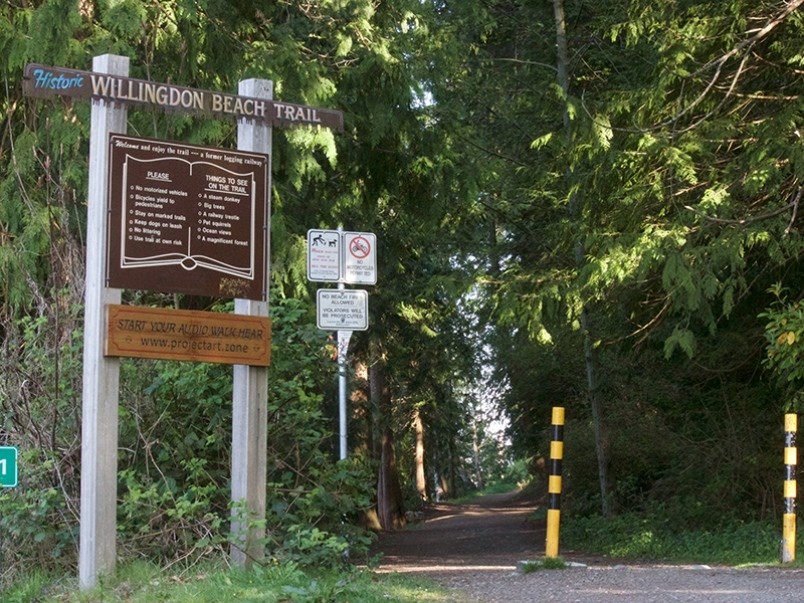As a result of a bear attack on two dogs near Willingdon Beach Trail on Thursday, July 12, the popular walking spot was temporarily closed. It reopened on Sunday, July 14.
“The conservation office service received a complaint on Thursday evening regarding a bear attacking two dogs near the north end of the Willingdon Beach Trail adjacent to Second Beach,” said BC Conservation Officer Service officer Andrew Anaka.
The attack actually occurred on the beach and not the trail, he added.
“One dog was killed and a second was severely injured, and in response to this the conservation office requested that the [City of Powell River] close down the trail, which they did within an hour,” said Anaka.
A live trap was deployed at the site of the attack, and the area was patrolled by vehicle and on foot. Anaka said the public should walk their dogs on leash and carry pepper spray or another option when out walking the trails.
“The chances of encountering a bear inside the city is far greater than out walking on a rural trail,” he said. “There are more bears in town than there are out of town, so please take precautions.”
Prior to this attack there had been four or five sightings of a bear matching the description in the same area, but none of these had been threatening, according to Anaka.
“In every case it was a sighting and the bear moved on when it saw people,” he said. “It wasn’t doing anything a bear shouldn’t do.”
For Tracy and Luke Raftl, the couple who lost their dog in the attack, this bear’s behaviour was atypical.
“This bear was not acting like a normal bear,” said Tracy. “Normally a bear wants to run away as soon as possible and makes a lot of noise. This bear was silent.”
Her husband was quietly reading a book and unaware of any disturbance.
“The dogs had their leashes on but he wasn’t holding them because he was at the beach and no one was there,” she said. When the bear emerged, it had an altercation with the first dog, which escaped; it then retreated back into the bush, returning later to attack the second dog.
“This is when Luke realized this wasn’t just a normal bear, this was a predatory bear,” added Tracy.
Anaka said it appeared that the first dog had reacted to the bear's presence. The attack on the second was indeed different.
“It literally hunted the second dog down and chased it to the water line, cornered it and killed it,” he added.
Predatory black bears are a rarity, according to Tracy.
“From what we’ve read, around one person every two years actually gets killed by a black bear in North America,” she said. “And when they do it’s in this situation where the bear silently stalks one person sitting or standing still for a long time. Like a fisherman whose been angling or in this case someone reading a book.”
Despite their terrible experience, the couple is sympathetic to the bear, said Tracy.
“I know that we’re taking over their territory and in a drought, maybe they’re hungry,” she added. “We don’t blame the bear in any way.”
Anaka said bear reports in the region have more than doubled from the same period a year ago.
“This year to date, April 1 until now, we’ve had 211 bear complaints,” he said. “There were about 90 complaints over the same period a year ago and all of last year we had 254 complaints.”
He noted that last year was especially quiet and complaints are up about 50 per cent over an average year. Still, the increase is significant.
“It seems like our population levels are high,” said Anaka. “We have a number of generational bears in the community. Bears that have been brought up in the community, have bred and raised their families here for generations. Most of our conflict bears are young; two and three years old.”
A food shortage did not appear to be drawing bears to the area, as they have resided here for generations, however, plentiful food supply keeps them close.
“There is so much to eat in this town; every backyard has a fruit tree or nut tree,” said Anaka. “People are getting good with their garbage but it’s still an issue and bird feeders are a huge issue.”
A kilogram of bird seed provides some 15,000 calories, making it an irresistible food source.
"That’s a couple of days rations for a bear; the reward is very high," added Anaka.
Although getting rid of bird feeders and keeping dogs on leashes can help mitigate interactions, the reality is this is bear country.
“Having a dog on a leash doesn’t preclude the fact there’s going to be some interaction; it reduces the risk but it doesn’t preclude that,” said Anaka. “Having a dog run off and chase a bear, on more than one occasion that dog has come back to the owner with the bear in tow. As far as people having their dogs for a swim, it’s unusual to take your dog for a swim on a leash; I understand that.”
Raftl said she and her husband are thankful for the outpouring of sympathy and support they have received from the community.
“Everybody’s been really kind and that’s helped,” she added. “We’re just really thankful we still have one dog.”
In situations where a bear encounters humans, it usually ends badly for the creature.
“What mostly happens with conflict bears is they get destroyed,” said Anaka. “The bear is always the one that loses, and in this case it was a dog’s life as well. Even if the bear is into fruit, garbage or bird feeders, it’s always the bear that pays the price.”
Bear sightings can be reported to the conservation reporting line at 1.877. 952.7277.



